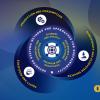
Options Winter 2020: A bold new research strategy will ensure that IIASA continues to fulfill its mandate of providing independent, systems science-based insights to global and universal challenges over the next decade.
For almost half a century, IIASA has been using a systems approach to help policymakers pursue win-win policies that jointly achieve multiple goals. The institute’s unique setting, along with its extensive global scientific network has become renowned for facilitating truly independent research that is free from national or political agendas. This disposition allows international research teams to combine their global knowledge to produce integrated systems solutions and policy insights to address current, emerging, and novel global and shared challenges. Building on existing expertise while developing new competencies, the next decade will see IIASA enhancing its capabilities and accountability towards providing policy-relevant, impactful research.
In pursuit of research excellence The new strategy, which will be implemented in 2021 along with a re-focusing of the institute’s scientific organizational structure, focuses on four key driving forces for development namely: governance and institutions; technology and innovation; economy and society; and population and behavior. These drivers interact in the domains of production and consumption; biodiversity and ecosystem services; and equitable and resilient societies. A systemic, integrated approach to these driving forces, and how they relate to addressing global challenges, form the cornerstone of the institute’s research priorities and are underpinned by a continued emphasis on methodological advances and innovations in system analysis methods and approaches for sustainability. “Extreme events like the current coronavirus pandemic add a new level of complexity to identifying integrated solutions to global sustainability. The global challenges we face are interlinked and actions in one area will affect others. As such, systems science provides the scientific and policy community with the skills and tools to engage successfully with these challenges,” explains IIASA Director General, Albert van Jaarsveld. Several projects that harness the opportunities arising from emerging digital technologies and their applications, as well as advancements in computing and big data capabilities, machine learning, and the use of artificial intelligence, are already laying the groundwork to realize the objectives of the new strategy.
 © IIASA
© IIASA
To make climate scenarios and digital technologies more accessible, for instance, IIASA researchers and colleagues from several other institutions have developed a comprehensive interactive online platform to help policymakers and businesses, finance actors, and civil society assess the threat of global warming and ways to limit it. The SENSES platform is the first of its kind to provide the tools to use scenarios, ranging from climate impacts to mitigation and energy options, to a broader public beyond science. Similarly, the Community Water Model - a large-scale, open source hydrological and water resources model developed at IIASA - will support and enable different stakeholder groups and scientific communities in the accurate assessment of water supply and the demands of both people and the environment.
IIASA will also continue to position itself as a leader in the field of earth observation and citizen science to conduct research and provide innovative, cost effective, and high quality data, tools, and services.
Building global research partnerships
Another dimension of the new strategy involves building on the institute’s record of scientific excellence, collaboration with partners, and policy impact. IIASA will continue to leverage its reputation as a neutral scientific broker and its strong networks with a wide range of stakeholders, member countries, and leading scientific organizations to build bridges across political divides and to confront and negotiate solutions to problems of global interest.
The World in 2050 (TWI2050) initiative established by IIASA, the Sustainable Development Solutions Network, and the Stockholm Resilience Centre to support the successful implementation of the UN’s 2030 Agenda, and the institute’s involvement in the Food, Agriculture, Biodiversity, Land, and Energy (FABLE) Consortium, which seeks to establish a model-aided decisionsupport environment for sustainable development pathways in the land-use space, are just two examples of the institute’s commitment to collaborative and inclusive research. Likewise, the consultative science platform that was recently jointly established with the International Science Council (ISC) combines the strengths and expertise of the two organizations with those of other international experts to define and design sustainability pathways in a transdisciplinary manner to enable a more equitable and sustainable post COVID-19 world.
Further examples of IIASA researchers’ involvement in large-scale initiatives include regular involvement as key contributors to the Intergovernmental Panel on Climate Change (IPCC) assessment reports, and contributions to the advancement of the field of Loss and Damage in the risk management domain.
Training the next generation of systems scientists
Any forward-looking strategy should of course also include a capacity-building component. In this regard, the institute postdoc opportunities and its flagship Young Scientists Summer Program (YSSP) have been instrumental in building capacity in systems thinking and analysis by educating and training a new generation of scientists, professionals, and leaders for almost as long as IIASA has been in existence.
As part of the new strategy, training activities at IIASA are being expanded substantially to go beyond its current constituencies to include key decision makers and influencers. As one of the world-leading one-stop destinations for systems analysis, IIASA is also making it its mission to make its data, models, and analytical tools openly available to the research community in a responsible manner.
“We are confident that the new strategy IIASA will soon embark on will more emphatically address the much needed systems science perspective to systematically and comprehensively reduce human footprints and enhance the resilience of natural and socioeconomic systems in pursuit of a sustainable future for humanity,” commented IIASA Deputy Director General for Science, Leena Srivastava. “IIASA has a clear head start in terms of tools, methods, and models to make it nimble enough to be responsive to the needs of society in times of great uncertainty associated with unforeseen events like the COVID-19 crisis, and also to address compound risk and the multiple dimensions of sustainability. I look forward to being part of the journey to make the objectives of the new strategy a reality.”
By Ansa Heyl